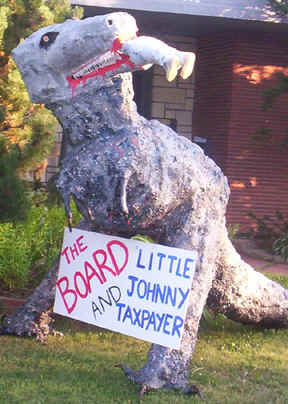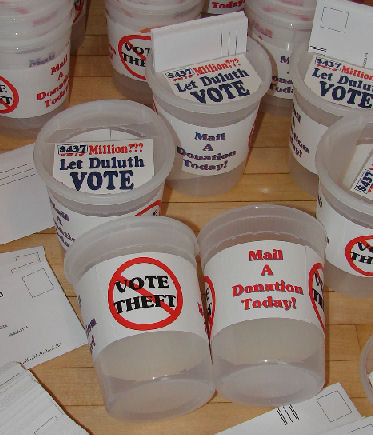


Do you know some place where we could put our return envelopes
for supporters to mail back donations?
Tell us where and we'll deliver them.
Donations online are no longer being processed.
|
|
|
11-3-2001 District plans rest with voteDuluth's attempt to balance budget with excess levy isn't uniqueNEWS TRIBUNE STAFF WRITER Duluth, like other school districts in state, places hopes on excess levy to balance books When Gov. Jesse Ventura unveiled his biennial budget last winter, teachers and parents decried the plan, contending the education financing was insufficient. To reduce property taxes, Ventura proposed to shift a greater share of school costs to Minnesota's income tax. "Democrats and Republicans alike agreed the governor's budget fell short,'' said Shelley Tougas, communications director for the Minnesota School Boards Association. His proposal would have left Duluth Public Schools with a $13.49 million deficit through 2003. School closures topped a local list of cost-cutting options, triggering a wave of objections. The Legislature's final allocation provided $1 billion in property tax relief but was more generous to schools. Still, it required Independent School District 709 to slash costs by $5.5 million through 2003. For the current school year, $2.96 million has been cut, eliminating 25 classroom instructors, 9.5 administrative positions, 8.3 support positions and $550,000 in teacher training funds. COMING UP SHORT Lawmakers proffered an option to help districts that considered state funding insufficient: Seek additional revenue through the local tax levy. The catch: Voter approval is required. Facing a $2.6 million deficit next year, a Duluth citizens' group, Vote Yes for Children, proposed to levy an additional $4 million against property each year until 2006. "If a levy passes, the district can keep its financial house in order, and retrenchment will not be a requirement,'' said group spokesman Aaron Bransky. It also will provide time for a new community group to finalize long-term plans for the district, he said. If approved, the levy annually will be supplemented by a $2 million state match, providing $6 million per year. Of that, $3.3 million will go toward cutting class sizes, $1.1 million will be used to reduce the projected $2.6 million deficit; $1.05 million will maintain or expand all-day kindergarten and middle school programming, and $550,000 will update equipment and programming in music, technology, art, libraries and science. Duluth isn't the only district looking for more money. On Tuesday, 178 Minnesota school districts will ask voters to collectively raise $213.5 million through property taxes. "The state is not kicking in sufficient funding, so local property owners are being asked to make up the difference,'' said Julio Almanza, Duluth schools superintendent. A HARD SELL "Going out for an operating levy is a tremendous amount of work. School board members -- who are parents, taxpayers and business owners -- don't make these decisions lightly,'' said Dick Anderson, executive director of the Minnesota School Boards Association. But it's a challenge they feel compelled to accept. Districts seeking excess levies in the Northland include Aurora, Barnum, Carlton, Cloquet, Cook County, Esko, Eveleth, Gilbert, Hermantown, International Falls, Mesabi East, Moose Lake, Mountain Iron, Buhl, rural St. Louis County, Virginia and Wrenshall. "We're hearing from both the state and federal governments that class sizes should be smaller, but funding is going the opposite direction,'' said Eric Kaiser, principal at Homecroft Elementary School. "Where the rubber meets the road -- at schools such as Homecroft -- we're having trouble making ends meet.'' That means class sizes are larger and supplies are in short supply. Some teachers buy them out of their own pockets, he said. Meanwhile, teacher salaries, when adjusted for inflation, actually decreased 4 percent between 1989 and 1999, according to a 2000 analysis of school district finances conducted by the Minnesota Office of the Legislative Auditor. "At one time, we cut fat to balance the budget. Now, we're literally cutting off body parts. Local taxpayers need to know we're not wasting their money. We're a pretty lean machine in Duluth,'' Kaiser said. Local opponents disagree, contending the Duluth School District has been ignoring a pending financial crisis. "Enrollment has been declining for several years. The board should have made cuts long ago,'' said Brad Bennett, executive director of the taxpayers' group Fight Inefficient Government and High Taxes. FIGHT endorsed two prior levies. Last week, however, members decided not to support the current request. Its greatest concern, Bennett said, is that Duluth has too many underused school buildings. "That problem compounds itself in many ways. It leaves the district with unnecessary heating costs and too many maintenance, food service and teaching positions,'' he said. "We also feel the district is from 6 to 8 percent heavy on administration.'' A COMMON DILEMMA According to figures compiled by the Minnesota Department of Children, Families and Learning, however, the district's spending pattern differs little from districts of similar size. With 4.7 percent of its budget allocated toward administration and 46.9 percent toward instruction, Duluth is on par with districts in Burnsville, Mounds View, North St. Paul, Robbinsdale, Rochester and south Washington County. The greatest cost increases have come elsewhere, according to the legislative auditor. Among the largest: a 61 percent hike in district-paid health insurance premiums from 1989 to 1999. Despite the dilemma, some organizations have refrained entirely from casting judgment on the proposal. The Duluth Area Chamber of Commerce, which also endorsed two prior levies, declined to take a position on the current proposal. Members had postponed a decision until levy proponents provided a detailed plan providing specific information on how the money would be spent. School Board members didn't vote on the levy spending plan until last Tuesday. "We'd love to be in a position to be excited about it,'' said Chamber of
Commerce President David Ross. "If it's unsuccessful, we'll help the school
district's leadership to begin developing a proposal for a referendum in the
future -- one that the community is familiar with.''
|
|